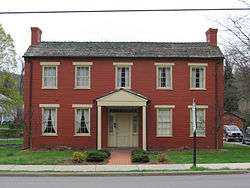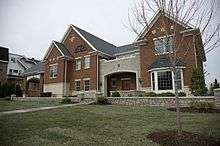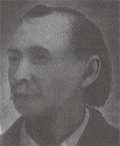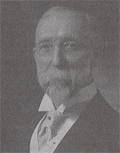Delta Tau Delta
| Delta Tau Delta | |
|---|---|
| ΔΤΔ | |
 | |
| Founded |
1858 Bethany College |
| Type | Leadership, Social |
| Scope | International |
| Mission statement | "Committed to Lives of Excellence"[1] |
| Motto | "Labor for the Beautiful and the Good" |
| Colors |
Royal Purple, White, and Gold |
| Flower | Purple Iris |
| Philanthropy | JDRF |
| Chapters | 130 active in the United States |
| Headquarters |
10000 Allisonville Road Fishers, IN, USA |
| Homepage | http://www.delts.org |
Delta Tau Delta (ΔΤΔ) is a United States-based international Greek letter college fraternity.[2] Delta Tau Delta was founded in 1858 at Bethany College, Bethany, Virginia, (now West Virginia). It currently has around 129 student chapters nationwide, as well as more than 27 regional alumni groups. Its national philanthropic partner is the diabetes research organization JDRF.[3]
History

Delta Tau Delta Fraternity was founded in 1858 at Bethany College in Bethany, Virginia (now West Virginia).[4] The social life on campus at that time centered around the Neotrophian Society, a literary society.
According to Jacob S. Lowe, in late 1858 a group of students met in Lowe's room in the Dowdell boarding house to discuss means to regain control of the Neotrophian Society and return control to the students at large. The underlying controversy was that the Neotrophian Society, in the opinion of the eight men who formed Delta Tau Delta, had awarded a literary prize after a rigged vote.[5] A constitution, name, badge, ritual and motto were devised, and Delta Tau Delta was born.[6]
Member Henry King Bell of Lexington, Kentucky, heard of the Civil War's effects on Bethany College and the membership of Delta Tau Delta. After riding to Bethany and realizing that the longevity of Delta Tau Delta was at risk, Bell traveled to Canonsburg, Pennsylvania. On February 22, 1861 Bell rode to Jefferson College (would later merge with Washington Academy to become the present day Washington & Jefferson College) from Bethany to bring the designation of the Alpha Chapter and the governance of the Fraternity back to his home campus.. In response to Jefferson College merging with the Washington Academy, an election was held at the General Convention (later to be renamed the Karnea). Ohio Wesleyan then assumed the Alpha designation. Before the Alpha designation was finally transferred to Allegheny College (its current location), the Ohio Wesleyan chapter dissolved temporarily because of a lack of membership.

After the Ohio Wesleyan chapter disappeared in 1875, the Allegheny College chapter, the fourth and final chapter to hold Alpha designation, assumed control of the fraternity. Allegheny College member James S. Eaton, traveled to Delaware, Ohio, to collect what remained of the organization's records and to investigate what had happened the Ohio Wesleyan chapter. Eaton brought the "Alpha" designation back with him to Allegheny College, where a group of undergraduates managed the larger organization as well as their own chapter. During that time a magazine was established and 15 chapters were founded, of which eight survive (several others were reestablished later).
In 1886, Delta Tau Delta merged with the secret society known as the Rainbow Fraternity, a southern fraternity founded in 1848 at the University of Mississippi.[7]
The Delta Tau Delta Founders House was listed on the National Register of Historic Places in 1979.[8]
Members of Delta Tau Delta are informally referred to as "Delts."
Founders
The eight men considered to be the Founders of the Delta Tau Delta fraternity are:
 | William Randolph Cunningham (Chair) | William Randolph Cunningham was only a freshman at the time Delta Tau Delta was formed. Because he was older and had become a Mason, he exerted much influence in the group. He served as President of the Karnea in 1883, was a minister and held public office in the state of Washington. |
 | Alexander Campbell Earle | Alexander Campbell Earle was the youngest of the group of eight founders of Delta Tau Delta. He went on to become a Captain in the Second South Carolina Volunteers, where he commanded his own company. For many years his whereabouts were unknown and he was believed dead, but he was finally located living in Arkansas. He later moved to Texas, and is buried in the State Cemetery in Austin, where the local fraternity still makes an annual pilgrimage.[9] |
 | Richard Havener Alfred | Richard Havener Alfred, at 26 the oldest of the group of founders of Delta Tau Delta, became a minister and a physician. |
 | Henry King Bell | Henry King Bell, a Kentuckian, lived only six years after graduation. Bell responded to a call for help from the last remaining members of the Bethany chapter who were leaving to join the armed forces. |
 | John Calhoun Johnson | John Johnson became a lawyer and politician. He was the political advisor to John W. Davis, the democratic candidate for president in 1924. He outlived the other founders by eight years. |
 | Jacob Snedeker Lowe | Jacob Lowe hosted the first meetings of the group in a rooming house which has now become an international shrine for the Fraternity. Lowe became a professor and later a college president. |
 | Eugene Tarr | Eugene Tarr was a "townie" whose home was only a short six miles from Bethany. He stayed in West Virginia after college. Tarr became a noted speaker, lawyer, and editor of the local newspaper. |
 | John Lucius Newton Hunt | John Lucius Newton Hunt was the scholar of the group. After graduating from Bethany, Hunt went on to become the valedictorian of his class at New York University's School of Law. He then served for several years as New York's Commissioner of Education. |
Notable Members and Alumni
All undergraduate chapters
See also
References
- ↑ "Delts to plant flag at University of Vermont". Delta Tau Delta. Retrieved 2009-02-28.
- ↑ "Two Secret Societies United.; Delta Tau Delta And The Rainbow Society Join Hands". The New York Times. 1885-03-28.
- ↑ http://www.delts.org/news/2012/06/15/general/delta-tau-delta-jdrf-form-national-philanthropic-partnership/
- ↑ "History - Delta Tau Delta". Delta Tau Delta. Retrieved 31 March 2014.
- ↑ University of Pittsburgh Delta Tau Delta web site.
- ↑ Albion College Delta Tau Delta web site.
- ↑ "Two Secret Societies United: Delta Tau Delta and the Rainbow Society Join Hands" (PDF). The News York Times. 1885-03-28.
- ↑ Staff (2010-07-09). "National Register Information System". National Register of Historic Places. National Park Service.
- ↑ http://www.cemetery.state.tx.us/pub/user_form.asp?step=2&pers_id=1091&last_name=Earle&first_name=Alexander
External links
| Wikimedia Commons has media related to Delta Tau Delta. |
| ||||||